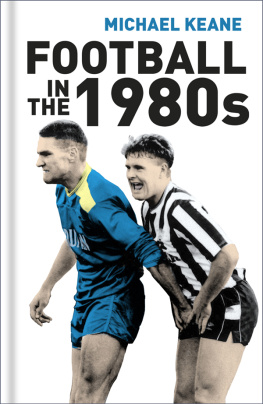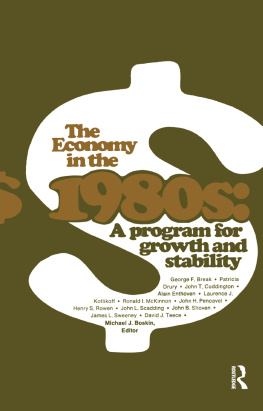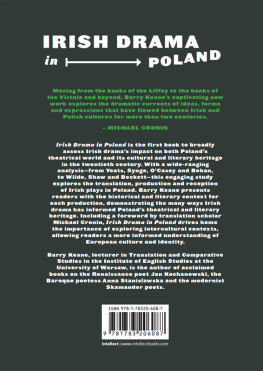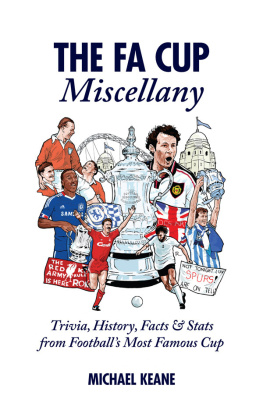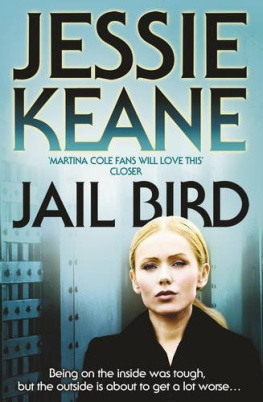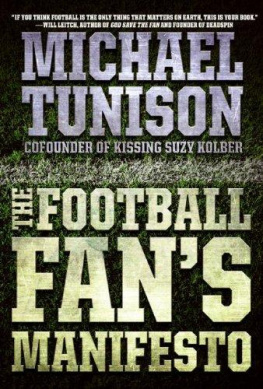Michael Keane - Football in the 1980s
Here you can read online Michael Keane - Football in the 1980s full text of the book (entire story) in english for free. Download pdf and epub, get meaning, cover and reviews about this ebook. genre: Home and family. Description of the work, (preface) as well as reviews are available. Best literature library LitArk.com created for fans of good reading and offers a wide selection of genres:
Romance novel
Science fiction
Adventure
Detective
Science
History
Home and family
Prose
Art
Politics
Computer
Non-fiction
Religion
Business
Children
Humor
Choose a favorite category and find really read worthwhile books. Enjoy immersion in the world of imagination, feel the emotions of the characters or learn something new for yourself, make an fascinating discovery.
- Book:Football in the 1980s
- Author:
- Genre:
- Rating:4 / 5
- Favourites:Add to favourites
- Your mark:
- 80
- 1
- 2
- 3
- 4
- 5
Football in the 1980s: summary, description and annotation
We offer to read an annotation, description, summary or preface (depends on what the author of the book "Football in the 1980s" wrote himself). If you haven't found the necessary information about the book — write in the comments, we will try to find it.
Football in the 1980s — read online for free the complete book (whole text) full work
Below is the text of the book, divided by pages. System saving the place of the last page read, allows you to conveniently read the book "Football in the 1980s" online for free, without having to search again every time where you left off. Put a bookmark, and you can go to the page where you finished reading at any time.
Font size:
Interval:
Bookmark:

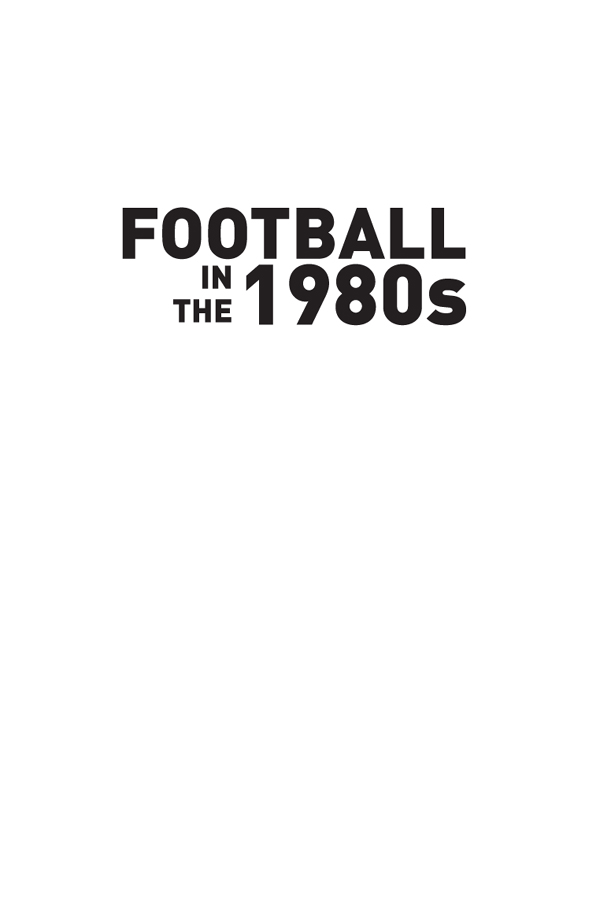

Cover illustration: Wimbledons Vinnie Jones gets to grips with Newcastle United footballer Paul Gascoigne during their League Division One match, 1988. (Mirrorpix)
First published 2018
The History Press
The Mill, Brimscombe Port
Stroud, Gloucestershire, GL5 2QG
www.thehistorypress.co.uk
Michael Keane 2018
The right of Michael Keane to be identified as the Author of this work has been asserted in accordance with the Copyright, Designs and Patents Act 1988.
All rights reserved. No part of this book may be reprinted or reproduced or utilised in any form or by any electronic, mechanical or other means, now known or hereafter invented, including photocopying and recording, or in any information storage or retrieval system, without the permission in writing from the Publishers.
British Library Cataloguing in Publication Data.
A catalogue record for this book is available from the British Library.
ISBN 978 0 7509 8956 5
Typesetting and origination by The History Press
Printed and bound in Great Britain by TJ International Ltd
eBook converted by Geethik Technologies
Thanks are due to several people who have helped me put this book together. Firstly, thanks are due to the staff at The History Press, Beth Amphlett, and Mark Benyon, for commissioning and publishing my book. Secondly, thanks are due to my brother Gerard, whose idea it was for me to specialise in the 1980s, and also to my other siblings, Bridget, Richard, Mary and Stephanie, for helping me navigate the decade in one piece. Finally, I would like to thank my own team at home, my wife Gabby and our children Thomas, Oliver, Patrick and Annabelle, who are the stars of my show.
Michael Keane
This book was written almost by chance and certainly for fun. The chance is easy enough to explain, as I will try to, and hopefully the fun will come in the reading of it.
Some time last year, on some errand or other, I found myself trawling through assembled junk in my attic. Once up there, I started to browse around to see what detritus I had insisted on keeping for years. After rummaging through various boxes, I soon found myself staring at the cover of one of my favourite ever singles, My Perfect Cousin, by The Undertones, (it reached no. 9 in March 1980, in case you need to know). Whether you know the track or not though God himself is rumoured to have it on his personal jukebox does not matter, as it was the cover not the song that sent me spinning back into some serious nostalgia. On that cover is the unmistakable, spindly figure of a Subbuteo player. He is wearing red and white and has a full house cheering him on. This chance discovery sent me racing to find first my old Subbuteo set just two drooping goal nets and scores of broken players remained and then, in the next shoebox along, my old programme collection. It was almost entirely from the 1980s, as I drew the line at paying more than 1.00 for a programme many years ago!
Flicking through various old programmes transported me back in time; in an instant, I was once again tuning into World of Sport with Dickie Davies; I was enjoying the wrestling on a Saturday afternoon with my dad; I was listening to the football scores on my tiny transistor; and I was playing with my personally customised Subbuteo set. I had managed to travel nearly three whole decades in the ten minutes me it took me to hop up my attic ladder.
I gazed at programmes featuring badly permed footballers; I cringed with dismay at the fact files documenting players favourite meals and actresses; but I warmed to the memories of long-forgotten games that had seemed magical at the time. I had got the nostalgia bug and I couldnt shake it. In fact, I got it so badly that the idea for this book first germinated and then started to grow.
I hope readers will share my enthusiasm for a decade in which I personally gorged on football. I feasted on FA Cup Finals, wondered at World Cups and simply shook my head at the state of the stadiums. All told, though, it was great fun for me to revisit memory lane and I hope you enjoy the trip too
BOTH BARRELS
In the 1980s there were some things you just took for granted: Margaret Thatcher won general elections, Liverpool won the league every year (almost), and Wimbledon won all the prizes for roughing up their opponents. Tales were plentiful of the The Dons antics under the stewardships of Dave Bassett and Bobby Gould: newly-arrived players found their suits were cut, on special occasions players were deposited in car boots and some poor souls were even tossed into canals!
Set against that background of pushing every boundary, the events of an afternoon at Plough Lane in February 1988 are not so hard to figure out. Midfield bulldozer Vinnie Jones was tasked with man-marking Newcastle Uniteds new kid on the block, a blossoming genius called Paul Gascoigne; he was not so much a bog-standard midfielder more of a footballing Gandalf, with the tricks, twists and touches of a footballing wizard. For Jones, the afternoons assignment was a bit like being asked to try and catch the wind, but not quite so easy.
Faced with the impossible job of nullifying Gascoignes brilliance, Jones hatched a plan of his own. Eschewing all recognised tactical nuances, the Dons destroyer instead focused on the basics, and decided that, when the referee was not looking, he would cut off Newcastles supply lines by simply grabbing Gazzas testicles. As the game petered out into a fairly drab 0-0 draw, Newcastles number eight was indeed unable to conjure up any great moments of magic, and so, not for the last time, Jones utilitarian approach enjoyed a measure of success.
The moment was captured in an image that almost defines the time it was taken in. On one side we see a stony-faced, snarling Jones, seeking any advantage he can muster as he squeezes the life out of an opponent. Then we see the victim, a still cherubic Gazza, wincing and grimacing, as his talent is temporarily reduced to rubble. Way back in the 1980s, in the days before uber-fit athletes and superstar players dominated, football could still make room for all sorts for artisans and artists, for Jones and Gascoigne, for the good, the bad and the ugly!
In the 1960s, under the management of Jimmy Hill, Coventry City quite rightly earned a name for innovation. Sky Blue Specials took travelling supporters on the train to away fixtures, the Sky Blue Pools raised cash and if that wasnt enough you could also ring up Sky Blue Rose for the latest club news. Those innovations had Hills trademark vision all over them and in 1981 he was at it again as he oversaw the planning, design and completion of Englands first all-seater stadium, at Highfield Road.
Increasing disturbances, both nationally and locally, had persuaded the Coventry board that something had to be done to remedy footballs biggest ill. A combination of all-seated spectators, all-ticket matches and increased prices (1.50 tickets rose to 5.00 if bought on match days), was the strategy, as City planned to price out the troublemakers and appeal to a new family audience. The opening day of the 1981/82 season saw real optimism as Dave Sextons young team beat Manchester United in front of a capacity crowd of 19,329. Briefly it seemed that Hill and Coventry might just be on to something.
Font size:
Interval:
Bookmark:
Similar books «Football in the 1980s»
Look at similar books to Football in the 1980s. We have selected literature similar in name and meaning in the hope of providing readers with more options to find new, interesting, not yet read works.
Discussion, reviews of the book Football in the 1980s and just readers' own opinions. Leave your comments, write what you think about the work, its meaning or the main characters. Specify what exactly you liked and what you didn't like, and why you think so.

